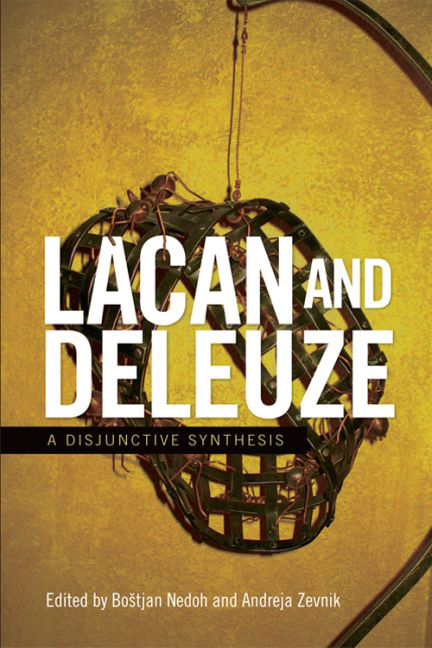Book contents
- Frontmatter
- Contents
- Acknowledgements
- Introduction: On a Disjunctive Synthesis between Lacan and Deleuze
- 1 For Another Lacan-Deleuze Encounter
- 2 Reciprocal Portrait of Jacques Lacan in Gilles Deleuze
- 3 Does the Body without Organs Have Any Sex at All? Lacan and Deleuze on Perversion and Sexual Difference
- 4 Gnomonology: Deleuze's Phobias and the Line of Flight between Speech and the Body
- 5 Lacan, Deleuze and the Politics of the Face
- 6 Denkwunderkeiten: On Deleuze, Schreber and Freud
- 7 Snark, Jabberwock, Poord'jeli: Deleuze and the Lacanian School on the Names-of-the-Father
- 8 Baroque Structuralism: Deleuze, Lacan and the Critique of Linguistics
- 9 Exalted Obscenity and the Lawyer of God: Lacan, Deleuze and the Baroque
- 10 The Death Drive
- 11 Repetition and Difference: Žižek, Deleuze and Lacanian Drives
- 12 Lacan, Deleuze and the Consequences of Formalism
- Notes on Contributors
- Index
7 - Snark, Jabberwock, Poord'jeli: Deleuze and the Lacanian School on the Names-of-the-Father
Published online by Cambridge University Press: 20 April 2017
- Frontmatter
- Contents
- Acknowledgements
- Introduction: On a Disjunctive Synthesis between Lacan and Deleuze
- 1 For Another Lacan-Deleuze Encounter
- 2 Reciprocal Portrait of Jacques Lacan in Gilles Deleuze
- 3 Does the Body without Organs Have Any Sex at All? Lacan and Deleuze on Perversion and Sexual Difference
- 4 Gnomonology: Deleuze's Phobias and the Line of Flight between Speech and the Body
- 5 Lacan, Deleuze and the Politics of the Face
- 6 Denkwunderkeiten: On Deleuze, Schreber and Freud
- 7 Snark, Jabberwock, Poord'jeli: Deleuze and the Lacanian School on the Names-of-the-Father
- 8 Baroque Structuralism: Deleuze, Lacan and the Critique of Linguistics
- 9 Exalted Obscenity and the Lawyer of God: Lacan, Deleuze and the Baroque
- 10 The Death Drive
- 11 Repetition and Difference: Žižek, Deleuze and Lacanian Drives
- 12 Lacan, Deleuze and the Consequences of Formalism
- Notes on Contributors
- Index
Summary
Introduction
From ‘From Sacher-Masoch to Masochism’ (1961) to Anti-Oedipus (1972), Deleuze's primary target when writing about psychoanalysis has been what he calls in 1961 Freudian psychoanalysis's ‘inflation of the importance of the father’. By 1967's Coldness and Cruelty he was training his sights on the Lacanian ‘Name-of-the-Father’, remarking critically that ‘Lacan appears to look upon this as a primary and irreducible operation which is independent of all maternal influence.’ In Anti-Oedipus, Deleuze pulls no punches, explicitly associating the Lacanian Name-of-the-Father with the despot in ‘barbarian’ societies, who phonetically re-‘codes’ and ultimately represses the primarily visual graphic inscription of desire on the body in ‘primitive’ societies (as carved out of ‘mother’ nature). Yet, as can be inferred from the above, while being critical of certain aspects, Deleuze also took psychoanalysis seriously enough during this decade of work to develop in painstaking technical detail an internal reconstruction of psychoanalysis's conception of, amongst others, infantile development, language acquisition and Oedipus.
Of these texts, Anti-Oedipus with its combative historicisation of the ontogenetic necessity and universality of the Oedipus complex has undoubtedly received the most attention. Yet a quieter, ‘structuralist’, critique of Oedipus already appeared in the pre-Guattari The Logic of Sense from 1969, and it is this critique that is arguably more interesting from a psychoanalytic and Lacanian perspective. Anti-Oedipus, with its nascent post-humanism, would pave the way for the cosmic theory of machines completed in A Thousand Plateaus, but The Logic of Sense remained embedded in a framework which, while philosophically antithetical to Lacanian concerns, was close enough theoretically to structuralism-influenced psychoanalysis to offer partial and productive bridges.
A reason for this, not least, is the historical coincidence of Deleuze's work in The Logic of Sense with parallel developments occurring at the time within the Lacanian school. Lacan famously elaborated a structural theory of Oedipus in the 1950s, reducing the father to the prohibitive ‘No!/ Name’ (Non/Nom, the two are homophonous) which metaphorises the infant's libidinal attachments to the mother (the ‘Desire-of-the- Mother’) such that, as signifiers, they are collected and repressed as the unconscious signified of the Name-of-the-Father (as signifier of symbolic Otherness and castration).
- Type
- Chapter
- Information
- Lacan and DeleuzeA Disjunctive Synthesis, pp. 105 - 122Publisher: Edinburgh University PressPrint publication year: 2017



